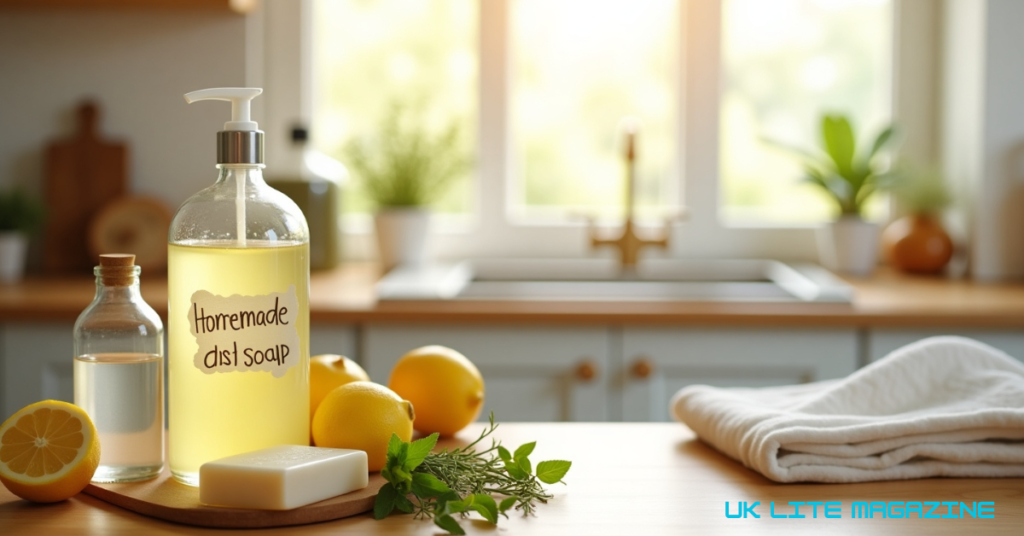When it comes to keeping your home clean and eco-friendly, switching to homemade cleaning products is a game-changer. Among these, homemade dish soap is a simple and effective solution for washing your dishes while avoiding the harsh chemicals often found in commercial products. Plus, it’s cost-effective and environmentally friendly!
In this article, we’ll explore how to make homemade dish soap using natural ingredients, along with some tips to ensure it works as effectively as store-bought alternatives.
Why Choose Homemade Dish Soap?
Homemade dish soap offers several benefits:
- Chemical-Free Cleaning: Avoid exposure to potentially harmful substances like sulfates, parabens, and artificial fragrances.
- Eco-Friendly: Reduces plastic waste and minimizes your carbon footprint.
- Cost-Effective: Homemade soap ingredients are often cheaper and can be used for multiple DIY cleaning products.
- Customizable: You can tweak the formula to suit your preferences or skin sensitivity.
Essential Ingredients for Homemade Dish Soap
Here are the natural ingredients commonly used in homemade dish soap recipes:
- Castile Soap
A plant-based, biodegradable soap made from olive oil or other vegetable oils. It’s a versatile cleaning agent that forms the base of many homemade cleaning products. - Baking Soda
Known for its grease-cutting properties, baking soda helps lift dirt and food particles off dishes while also deodorizing them. - White Vinegar
Vinegar is a natural disinfectant and helps break down grease, leaving your dishes squeaky clean. - Essential Oils
Add fragrance and antibacterial properties. Popular options include lemon, tea tree, and lavender essential oils. - Water
To dilute the soap and create a liquid consistency. - Optional: Washing Soda
Similar to baking soda but more alkaline, washing soda boosts cleaning power, especially for greasy or stubborn stains.
Homemade Dish Soap Recipe
Here’s a simple recipe to make your own natural dish soap:
Ingredients:
- 1 cup liquid Castile soap
- 1 tablespoon baking soda
- 1 tablespoon white vinegar
- 5-10 drops of essential oil (lemon or tea tree recommended)
- 2 cups warm water
Instructions:
- In a mixing bowl, combine the Castile soap and warm water. Stir gently to avoid creating too many bubbles.
- Add the baking soda and stir until it dissolves completely.
- Slowly mix in the white vinegar. Be cautious, as it may fizz briefly.
- Add your preferred essential oil for fragrance and antibacterial properties.
- Pour the mixture into a clean, reusable soap dispenser.
Your homemade dish soap is ready to use! Shake the bottle gently before each use to ensure the ingredients are well-mixed.
Tips for Effective Homemade Dish Soap
- Adjust Ingredients as Needed: If you find the soap isn’t cutting through grease effectively, try adding a bit more baking soda or a few drops of washing soda.
- Store Properly: Use a sealed container to keep the soap fresh and prevent it from drying out.
- Test on Dishes: Before using it on delicate glassware or fine china, test the soap on a small area to ensure it doesn’t leave streaks.
- Use Warm Water: Warm water enhances the grease-cutting power of homemade dish soap.
Advantages of Using Natural Ingredients
- Skin-Friendly: Natural ingredients are gentle on the skin, making them ideal for people with allergies or sensitive skin.
- Safe for the Environment: Ingredients like Castile soap and vinegar break down easily without polluting waterways.
- Affordable: Most of the ingredients are likely already in your kitchen or can be bought in bulk.
Common Challenges and Solutions
1. Soap Separation
- Solution: Shake the bottle before use to mix the ingredients.
2. Streaky Dishes
- Solution: Rinse thoroughly with warm water to remove residue.
3. Thicker Consistency
- Solution: Add a small amount of water and mix until the desired consistency is achieved.
Conclusion
Making your own dish soap with natural ingredients is a simple, effective way to embrace a greener lifestyle. Not only does it help you avoid harmful chemicals, but it also allows you to customize your cleaning products according to your needs. By incorporating these natural ingredients into your daily routine, you’re contributing to a healthier home and a cleaner planet.
Frequently Asked Questions (FAQs)
1. Can I use this soap in a dishwasher?
No, this recipe is designed for hand-washing dishes. Dishwashers require specific types of detergent to function effectively.
2. How long does homemade dish soap last?
Homemade dish soap can last up to a month if stored in a sealed container. Avoid contamination by using clean utensils when mixing.
3. Can I substitute Castile soap?
Yes, you can use any mild, natural liquid soap, but Castile soap is preferred due to its biodegradability and effectiveness.
4. What if my soap doesn’t lather like commercial brands?
Natural soaps often produce less lather but clean just as effectively. Focus on the cleaning power rather than the foam.
5. Is vinegar safe for all dish types?
Vinegar is safe for most dishes but should not be used on aluminum or cast iron as it can cause damage.
By following these steps and tips, you’ll have clean dishes and a clear conscience knowing you’ve made an eco-friendly choice. Happy cleaning!

